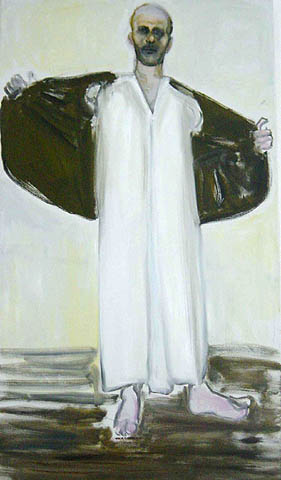Endangered Species: The Prophet
 A friend told me today that he feels as though I am a rare breed of prophet. He knows my passion for justice and my advocacy on behalf of the least of these in society. I think this is one of the best compliments I’ve ever received. I, of course, felt unworthy of the nicety and replied with, “I’d like to be, but I think I need to sell a few more of my possessions before I would feel good being called that.”
A friend told me today that he feels as though I am a rare breed of prophet. He knows my passion for justice and my advocacy on behalf of the least of these in society. I think this is one of the best compliments I’ve ever received. I, of course, felt unworthy of the nicety and replied with, “I’d like to be, but I think I need to sell a few more of my possessions before I would feel good being called that.”The truth is, being a prophet is one of my dream jobs. I would love to have a gig where I shaved my head, dressed in sackcloth, and walked around our American cities and their symbols of decadence and proclaimed how much we were missing the point. No cell phone, no email address, no boardrooms, no mortgages, no insurance, no bank account. It would be me, my clothes of burlap, my agenda, and maybe a few disciples.
Of course, this picture of prophecy is a tad different from the ones we read about in the Old and New Testaments. There, we see prophets willing to literally risk their lives to call out kings and heads of state. Some were thrown in prisons and lions’ dens, and some were beheaded. Being a prophet doesn’t pay well, and it may even cost you everything.
But today, there is still a high need for prophets. I’m not talking here about people who can tell the future, but people who hold up mirrors. Prophets are people who say to anyone in general and to themselves in particular, “Look. Take a good long look. Are you living up to the standards you should be? Are you following and copying the life of the God you claim to love? Can you be doing more or be doing better?”
Today, this will make you unpopular. You may not be thrown into prison, and I’m not sure where to find a lions’ den (other than the zoo). But you will get weird looks, the rich may not invite you to their dinner parties, and you definitely won’t get elected to anything other than the Crazy Hall of Fame.
But we can’t hesitate to act because we’re fearful of how others may react. Prophets today may not have the threat of beheading or need the wardrobe of John the Baptist, but they are still needed to call attention to the same injustices that existed years and years ago. Inequality is often the foundation upon which societies are built, and the gap continues to widen between the very rich and the very poor. If we ignore the realities of the needs of the world, we can forget any chance of the Kingdom of God being made manifest here on earth.
The church is the obvious place in which our modern prophets should be found. The church should be the training ground for these prophets, the place where they learn the ‘why’ and the ‘so what’ of the importance of caring about other people. Lots of people and places do lots of good for lots of other people and places for lots of reasons. But, the church is in a unique position as a community of God to change people’s lives for now and forever. Tenderly treading the line between the temporal and the eternal, the church has the power to radically revolutionize this globe and heaven all at once.
Modern day prophets do exist. Men and women around the globe are educating their fellow men and women about the injustices that pervade our communities from Atlanta to Africa. Some have high and lofty pulpits and some have but a few listeners in a small corner of earth. The message of some is transported by mass media to anyone with the capability and willingness to listen while the story of some travels via world of mouth until everyone feels the murmuring of a revolution. Unfortunately, it is very easy to ignore the voices of others and the still small voice inside of us begging for change. We can turn on our TV, get in our car, or have a drink. In this era of convenience, it has become very easy to not notice those who need to be. We drown out voices of compassion with tools of pleasure and the world is worse because of it.
What makes a prophet? Anyone who has a story to tell that will benefit those who cannot speak for themselves can occupy the office of prophet. The rewards may not be noteworthy in terms of money and assets, but seeing someone get the water or food they need has its own kind of satisfaction.
I’m off this weekend to speak at a Disciple Now. While this could be a simple trip down memory lane in terms of theology and programming, this one promises to be different. Instead of merely focusing on getting teenagers to read their Bible more or feel bad when they do something bad, a bold youth minister has decided that his students need to be aware of the international crises that don’t get the airtime they need. It promises to be a weekend of prophecy.
But I may leave my burlap at home.



Comments (0)
Post a Comment